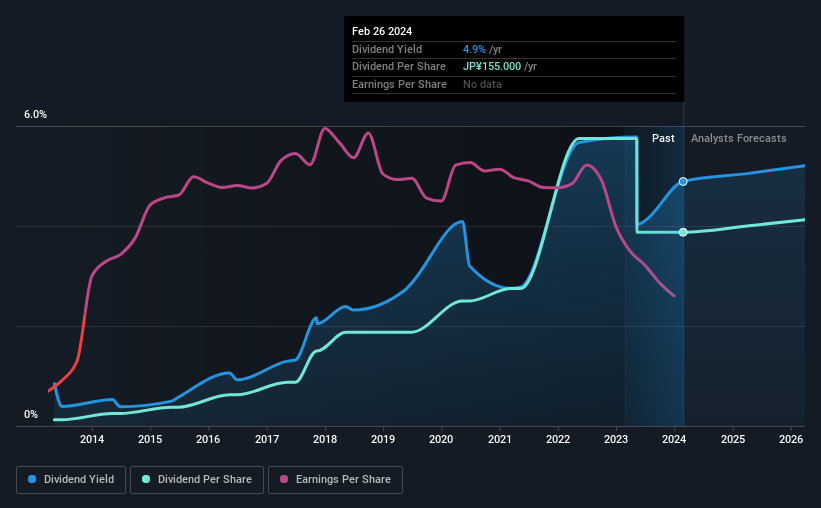- Japan
- /
- Construction
- /
- TSE:1822
Daiho (TSE:1822) Has Announced That Its Dividend Will Be Reduced To ¥27.00

Daiho Corporation (TSE:1822) is reducing its dividend from last year's comparable payment to ¥27.00 on the 1st of July. However, the dividend yield of 4.9% is still a decent boost to shareholder returns.
Check out our latest analysis for Daiho
Daiho's Payment Has Solid Earnings Coverage
We like to see robust dividend yields, but that doesn't matter if the payment isn't sustainable. Before this announcement, Daiho was paying out 490% of what it was earning, and not generating any free cash flows either. Paying out such a large dividend compared to earnings while also not generating any free cash flow would definitely be difficult to keep up.
Over the next year, EPS is forecast to expand by 34.8%. Under the assumption that the dividend will continue along recent trends, we think the payout ratio could be 55% which would be quite comfortable going to take the dividend forward.

Daiho Has A Solid Track Record
The company has an extended history of paying stable dividends. Since 2014, the annual payment back then was ¥5.00, compared to the most recent full-year payment of ¥155.00. This implies that the company grew its distributions at a yearly rate of about 41% over that duration. We can see that payments have shown some very nice upward momentum without faltering, which provides some reassurance that future payments will also be reliable.
Dividend Growth Potential Is Shaky
Some investors will be chomping at the bit to buy some of the company's stock based on its dividend history. However, initial appearances might be deceiving. Daiho's earnings per share has shrunk at 34% a year over the past five years. A sharp decline in earnings per share is not great from from a dividend perspective. Even conservative payout ratios can come under pressure if earnings fall far enough. It's not all bad news though, as the earnings are predicted to rise over the next 12 months - we would just be a bit cautious until this becomes a long term trend.
Daiho's Dividend Doesn't Look Sustainable
In summary, dividends being cut isn't ideal, however it can bring the payment into a more sustainable range. While the current distribution levels might be a bit unsustainable, we can't deny that until now it has been very stable. We would be a touch cautious of relying on this stock primarily for the dividend income.
Investors generally tend to favour companies with a consistent, stable dividend policy as opposed to those operating an irregular one. Still, investors need to consider a host of other factors, apart from dividend payments, when analysing a company. Case in point: We've spotted 3 warning signs for Daiho (of which 1 shouldn't be ignored!) you should know about. If you are a dividend investor, you might also want to look at our curated list of high yield dividend stocks.
New: Manage All Your Stock Portfolios in One Place
We've created the ultimate portfolio companion for stock investors, and it's free.
• Connect an unlimited number of Portfolios and see your total in one currency
• Be alerted to new Warning Signs or Risks via email or mobile
• Track the Fair Value of your stocks
Have feedback on this article? Concerned about the content? Get in touch with us directly. Alternatively, email editorial-team (at) simplywallst.com.
This article by Simply Wall St is general in nature. We provide commentary based on historical data and analyst forecasts only using an unbiased methodology and our articles are not intended to be financial advice. It does not constitute a recommendation to buy or sell any stock, and does not take account of your objectives, or your financial situation. We aim to bring you long-term focused analysis driven by fundamental data. Note that our analysis may not factor in the latest price-sensitive company announcements or qualitative material. Simply Wall St has no position in any stocks mentioned.
About TSE:1822
Daiho
Engages in the civil engineering and construction business in Japan and internationally.
Adequate balance sheet with moderate growth potential.
Market Insights
Community Narratives



